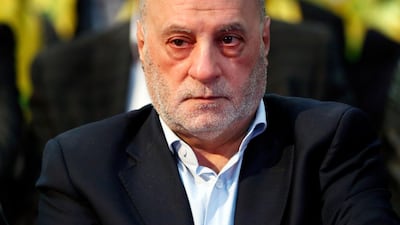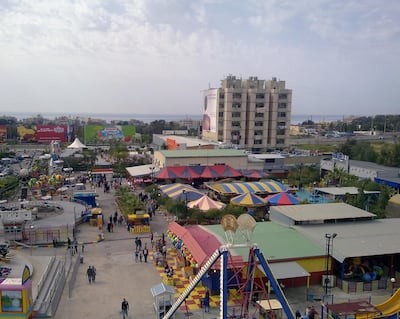A south Beirut amusement park serves as a commercial link between Hezbollah MP Amin Sherri, who the United States sanctioned on Tuesday, and a leading Hezbollah financier mentioned in Washington's action, according to corporate records accessed by The National.
In a press release explaining its latest sanctions against Hezbollah, the US Department of Treasury said that Sherri and Adham Tabaja “have continued to do business together despite the latter’s designation” in 2015 as a financier for the Lebanese group.
“Sherri and Tabaja, among others, founded and were involved in a Lebanon-based company,” the US Treasury added, without naming the firm in question.
Corporate records obtained by The National reveal that Sherri is one of the founders of Fantasy World, a family-themed fun park that the same records list Tabaja as the majority owner and manager. The Hezbollah MP does not appear to have any other direct commercial interests in Lebanon.
The US said that Tabaja has “direct ties” to senior Hezbollah officials and the group’s operational element, the Islamic Jihad Organisation. In 2015, the US sanctioned one of his companies, Al-Inmaa Engineering and Contracting, for providing “both financial support and organisation infrastructure” for Hezbollah. Earlier this year, the American Rewards for Justice programme offered $10 million for information on three of Hezbollah's financiers, including Tabaja.
Al-Inmaa Engineering and Contracting executed the project to build the Fantasy World amusement centre in 1999, according to the real estate company’s website. In March 2018, Sherri held a campaign meet-and-greet with voters at the Fantasy World restaurant, ahead of the May elections in which he won a seat in Lebanon’s parliament.
According to the US, Sherri has “used the weight of his representative role within Hezbollah to influence decision-making and pressure financial institutions to assist Hezbollah in limiting the impact of US sanctions.”
“Sherri also facilitated Tabaja's access to Lebanese banks and was directed by Hizballah Secretary General Nasrallah to settle issues related to his designation,” Washington added, using an alternative spelling for the group.
Sherri, a Beirut-native hailing from a family that was active in Lebanon’s commercial and industrial sectors, first served in parliament from 2005 to 2009. As per a family death notice published earlier this year in Lebanese news outlets, his brother-in-law, Ahmad Safa, is an executive board member of the Banking Control Commission of Lebanon, a watchdog body funded by Lebanon’s central bank.
When asked by reporters about his sanctioning while entering parliament, Sherri said he could “only smile”. Meanwhile, fellow Hezbollah MP Ali Fayyad blasted the US action, which represents the first-ever sanctions imposed on Hezbollah politicians.
“The US sanctions are an insult to the Lebanese people,” Mr Fayyad said in an interview with a local television station, calling for the Lebanese government and parliament to formulate an official condemnation.
In addition to Sherri, the US on Tuesday sanctioned top Hezbollah politician Mohammad Raad and security official Wafiq Safa for "acting for or on behalf" of the Lebanese group, a key proxy of Iran that has fought on behalf of the Syrian government.
Matthew Levitt, a former US Treasury official who is the director of counter-terrorism and intelligence programme at the Washington Institute for Near East Policy, told The National that it is "important to note the non-political actions of these Hezbollah politicians".
He pointed out that the US statement accused Safa of exploiting ports and border crossings to facilitate contraband smuggling as well as working with Raad to maintain a list of Hezbollah members to acquire foreign passports.
The US Treasury press release made several references to Sherri’s business associate Tabaja, saying that Raad met with the financier “to ensure Hezbollah's funding mechanisms would remain open despite sanctions.” The US added that Safa “maintained a close relationship” with Tabaja.
Hezbollah is blacklisted by numerous countries, including the US, UK and Gulf states, as a terrorist group. The US Department of Treasury imposed more sanctions on Hezbollah-related individuals and entities in 2018 than in any previous year. That same year, US President Donald Trump signed into law a Congressional bill expanding sanctions on foreign entities that support Hezbollah and its agents.


